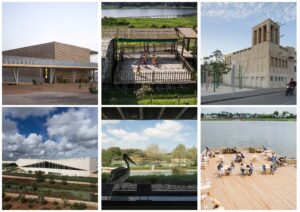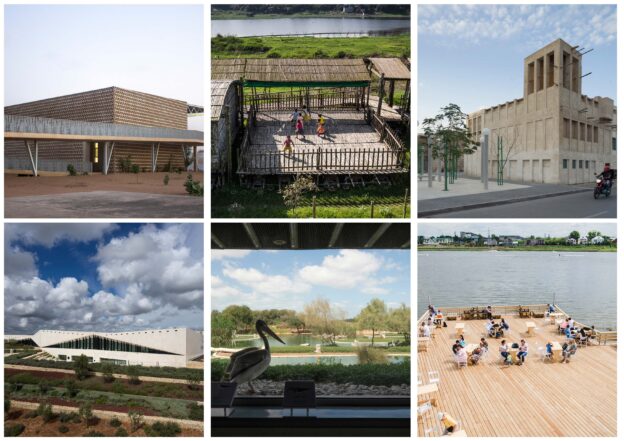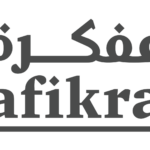 The six recipients of the Aga Khan Award for Architecture (AKAA) were announced today at a ceremony in Kazan, in the Republic of Tartarstan. The recipients are a revitalization of Muharraq, Bahrain highlighting the World Heritage site’s pearling history; an “amphibious” school in South Kanarchor, Bangladesh; the sustainably constructed Palestinian Museum in Birzeit, Palestine; the development of 328 public spaces for recreation in the Republic of Tartarstan; an extension of the campus of Alioune Diop University in Bambey, Senegal; and the restoration of an indigenous ecosystem in Sharjah, UAE.
The six recipients of the Aga Khan Award for Architecture (AKAA) were announced today at a ceremony in Kazan, in the Republic of Tartarstan. The recipients are a revitalization of Muharraq, Bahrain highlighting the World Heritage site’s pearling history; an “amphibious” school in South Kanarchor, Bangladesh; the sustainably constructed Palestinian Museum in Birzeit, Palestine; the development of 328 public spaces for recreation in the Republic of Tartarstan; an extension of the campus of Alioune Diop University in Bambey, Senegal; and the restoration of an indigenous ecosystem in Sharjah, UAE.
Recipients were announced by Irada Ayupova, Minister of Culture of the Republic of Tatarstan and Farrokh Derakhshani, Director of the Aga Khan Award for Architecture, at a press conference in Kazan. This is the 14th cycle of the Award, first presented in 19808. The shortlist of 20 projects was announced in April.
The Aga Khan Award for Architecture was established by the Aga Khan in 1977 to identify and encourage building concepts that successfully address the needs and aspirations of communities in which Muslims have a significant presence. The Award recognizes examples of architectural excellence in the fields of contemporary design, social housing, community improvement and development, historic preservation, reuse and area conservation, as well as landscape design and improvement of the environment. The Aga Khan Award for Architecture’s mandate is different from that of many other architecture prizes: it not only rewards architects, but also identifies municipalities, builders, clients, master artisans and engineers who have played important roles in the realization of a project. Prizes have been given to projects across the world, from France (Institut du Monde Arabe, 1989) to China (twice, most recently for Micro Yuan’er Children’s Library & Art Centre in 2016). Architects and planners from New York to Dhaka have received one of 122 awards. During the nomination process, more than 9,000 building projects have been documented.
The nine members of the 2019 Master Jury are: Anthony Kwamé Appiah, an Anglo-Ghanaian American philosopher; Meisa Batayneh, founder and principal architect of maisam architects & engineers; Sir David Chipperfield, whose practice has built over 100 projects for both the private and public sectors; Elizabeth Diller, a founding partner of a design studio whose practice spans the fields of architecture, multi-media performance and digital media; Edhem Eldem, a Professor of History at Boğaziçi University (Istanbul) and the Collège de France; Mona Fawaz, a Professor in Urban Studies and Planning at the Issam Fares Institute of Public Policy at the American University of Beirut; Kareem Ibrahim, an Egyptian architect and urban researcher who has worked extensively in Historic Cairo; Ali M. Malkawi, a professor at Harvard University’s Graduate School of Design and a founding director of the Harvard Center for Green Buildings and Cities; and Nondita Correa Mehrotra, an architect working in India and the United States, and Director of the Charles Correa Foundation.
The Steering Committee is chaired by His Highness the Aga Khan. The other members of the Steering Committee are: Sir David Adjaye, Principal Adjaye Associates, London; Mohammad al-Asad, Founding Director, Center for the Study of the Built Environment, Amman; Emre Arolat, Founder, EAA- Emre Arolat Architecture, New York-London-Istanbul; Francesco Bandarin, Special Advisor, UNESCO, Paris; Hanif Kara, Design Director – AKT II, London, and Professor at the Harvard University Graduate School of Design, Cambridge, MA; Azim Nanji, Special Advisor, Aga Khan University, Nairobi; Nasser Rabbat, Aga Khan Professor, Massachusetts Institute of Technology, Cambridge; Brigitte Shim, Partner, Shim-Sutcliffe Architects, Toronto; and Marina Tabassum, Principal, Marina Tabassum Architects, Dhaka.

